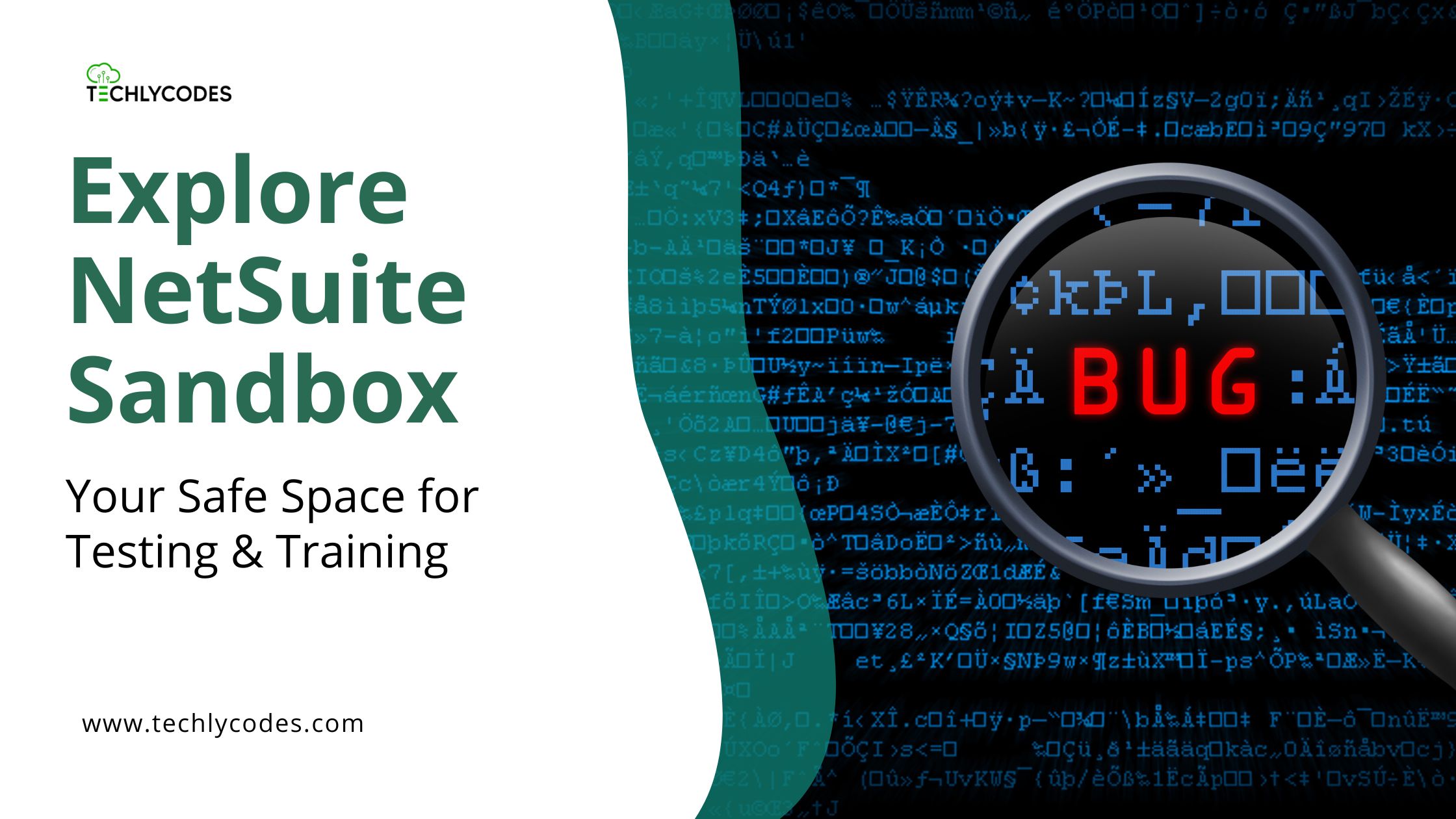Assuming you ever would have liked the chance to tap a grade or undo button for some major change to the business software you are using or seeing used, then you can find many comrades. And it is there that NetSuite Sandbox enters in-a secure, isolated oval, where you may experiment, fine-tune, and learn without including any danger to your live information. So what is NetSuite Sandbox and why and how do you make the most of it? People to people, cue in, lets break it down.
What is NetSuite Sandbox?
Here is What NetSuite Sandbox exactly is — and why finance, operations, and IT teams actually love it.
Suppose you have a high stakes restaurant. Your production NetSuite? The kitchen there, that is during dinner time at its peak. There is no option of experimenting with a new recipe or replacing the stove when the customers are waiting. This is where the Sandbox will enter through the fray, us writer types call it our test kitchen. Separate, secure, full-featured environment within which to experiment with new materials (read: scripts, workflows, integrations, etc.) without touching your live orders (or rather, your production data).
However, this is what is important about it, this is not any hollowed out or denuded version. The Sandbox is a replica of your real NetSuite environment. That consists of your records, roles, configurations, and even NetSuite customizations. That way when you test something you are testing it in an environment that is quite similar to the real thing. It will be as near as it is possible to get to going live… without really going live.
Things may be smashed, Edge cases can be tested, Staff training opportunities are available. And without any risk to a single transaction on your live system. Consider there is a jungle that functions as your playground-lab-protection-net.
Why Use NetSuite Sandbox?
You might be wondering, “Is a sandbox necessary?” The quick response: Yes, you should, if you prize stability, innovation and peace of mind.
That is why the businesses both big and small use NetSuite Sandbox:
Safe Testing Ground: You can test new things, like features, scripts or integrations without affecting your live operation.
Custom Development: Develop and iterate upon customizations offline, so you do not interfere with your daily business.
Training: Bring and train new members of the team in a risk-free environment.
Testing: Before making a new workflow, or other significant upgrade official, experiment with the new ideas to try out scenarios like “what if” scenarios on test.
In a word, NetSuite Sandbox is your backup against incurring costly errors and outages.
Key Features of NetSuite Sandbox
We should be a bit more concrete. The following are the best qualities that NetSuite Sandbox had to offer that would recommend it to any serious NetSuite user:
Total Isolation to Production: Alteration of the sandbox does not affect your live data. Period.
It has Realistic Testing Environment: Its a real copy of your production account, and therefore what you can do in the sandbox will work in real-life (and vice versa).
Integration Testing: Securely interlink and test third-app or custom integration.
User Training Platform: Train personnel in new features or processes without risk of them learning on the job in production.
Regular Refreshes: Make sure your sandbox is refreshed with current data and settings of production .
How Does NetSuite Sandbox Work?
How to Request a NetSuite Sandbox
NetSuite Sandbox is not included in every license automatically. You do need to request a sandbox (that NetSuite creates a copy of your production environment). In case you do not know whether your business has access:
- Go to Setup > Company > View Billing Information.
- Or check with your NetSuite Account Manager.
Sandbox licenses are normally introduced in the first sales process or renewal of these licenses.
Here’s how it all comes together:
Refreshes You may refresh your sandbox to ensure that the most current data and settings are pulled in the production. Note though, a refresh destroys any work in the sandbox made after the last refresh so always save your work!
Refreshing the Sandbox:
You are able to refresh your sandbox to bring in the new data and settings into production. Note though, a refresh destroys any work in the sandbox made after the last refresh so always save your work! A refresher would not be amiss:
- After major production changes.
- Before beginning a new testing phase.
Caution: A refresh replaces all of the Sandbox- scripts, data, workflows. Before refreshing, you always should back up custom work.
Testing & Development: Perform development, test and validate against the changes in the sandbox. When you are satisfied, you can take them to production.
Training: Train your team members to work in the sandbox, thus they can be relaxed when they have to go live.
It’s that simple—and that powerful.
Best Practices for Using NetSuite Sandbox
Wish to help your NetSuite Sandbox achieve maximum? The following are tested pieces of advice by people who have been in the situation:
- Reflect Your Production System: Ensure that your sandbox is similar to your live system. This implies frequent updates and extra set-up .
- Keep a From-scratch Documentation: Document every change, script and customization. Doc save headaches in future.
- Test Comprehensively: Do not only test the “happy path.” Do your best to break things! The more testing done the less surprises during production.
- Control Access: Restrict access to sandbox to minimal people. This maintains your test environment clean and safe.
- Simulate Real-World Scenarios:They run with real data, and real workflows. Use of only perfect data during testing will result in missing the edge cases that create the problems at production level .
- Train in the Sandbox: Its perfect as a training ground when bringing on new hires or launching new features.
- Communicate Refresh Schedules: Inform all your staff about the forthcoming refreshment to ensure no one loses performative work
Can You Move Data Between Sandbox and Production?
Short answer: Not automatically.
You cannot be able to directly push changes made in Sandbox to Production. You will have to re-implement customizations manually or implement SuiteCloud Development Framework (SDF), to efficiently implement changes.
By 2025, additional teams will use CI/CD pipelines with SDF to simplify migration/ version control.
Common Challenges (and How to Solve Them)
There is nothing perfect, and this is also true to NetSuite Sandbox. These are some of the known pain points- and how to address them:
1. Data Synchronization
The Problem: Your sandbox becomes unsynchronized with the production, and thus your testing is no longer accurate.
The Fix: Plan quarterly (that seems like a good guideline) refreshes to happen in between major projects.
2. Lost Customizations After Refresh
The Problem: A refresh deletes any changes done in sandbox.
The Fix: Do version control and always save before a refresh. It can be assisted with such tools as SuiteBuilder or SuiteCloud Developer Framework ..
3. User Access Issues
The Problem: Permission and roles of users are reverted resetting.
The Fix: Before refreshing, export all user roles and permissions so that you could restore them within a short period of time.
4. Integration Breakdowns
The Problem: After a refresh, the integrations or custom scripts break.
The Fix: Verify that all integration tokens and credentials again after refresh and make a habit of performing test integrations in sandbox and then transfer to production .
5. Data Security
The Problem: shred It may be that sensitive data is exposed in the sandbox.
The Fix: Mask or eliminate sensitive data, and restrict sandbox to ample staff .
The Benefits
- Eliminate Expensive Errors: An error that takes place during production may run in excess of a years worth of sandbox fees.
- Quicker Development: Developers will be able to work without any fears and more dependable roll-outs can be achieved.
- Improved Training: Newbies learn more quickly and raise training costs.
- Operational Agility: You are able to change with changes, and to experiment without risk .
Recent Updates You Should Know (2025 Edition)
NetSuite is constantly changing and in the case the sandbox as well. The following could be some of the recent changes as far back as 2025:
Outbound Single Sign-On (SuiteSignOn) End of Support: This feature has been deprecated in favor of the more secure OIDC Provider. You need to migrate off SuiteSignOn, should you still be using it.
Connect Data Source Changes to SuiteAnalytics: The older NetSuite.com data source will be retired, and will be fully removed in 2026.1. To maintain the normalcy, make sure that you are on NetSuite2.com.
Functional Enhancements: improvements such as Fixed Assets and CRM, Supply Planning, etc, that helps ensure a smoother experience in your sandbox (and production) environment.
Remaining abreast of these changes will make sure that you make the best use of your NetSuite Sandbox.
Final Thoughts
NetSuite Sandbox is not a luxury but must have element to any company that wishes to innovate in a controlled way, and train their employees properly without cutting into the bottom line of the company. When you will have knowledge about what it is, how it works and how to use it sensibly you will ensure that your team is successful.
Don t forget: The best way to study is to work. Don’t be afraid then to roll up your sleeves, get into the sandbox and start experimenting. And when you get stumped, remember, you alone are not–there are loads of other NetSuite users out there with hints, tricks and horror stories to share.
Happy testing!


Leave a Reply